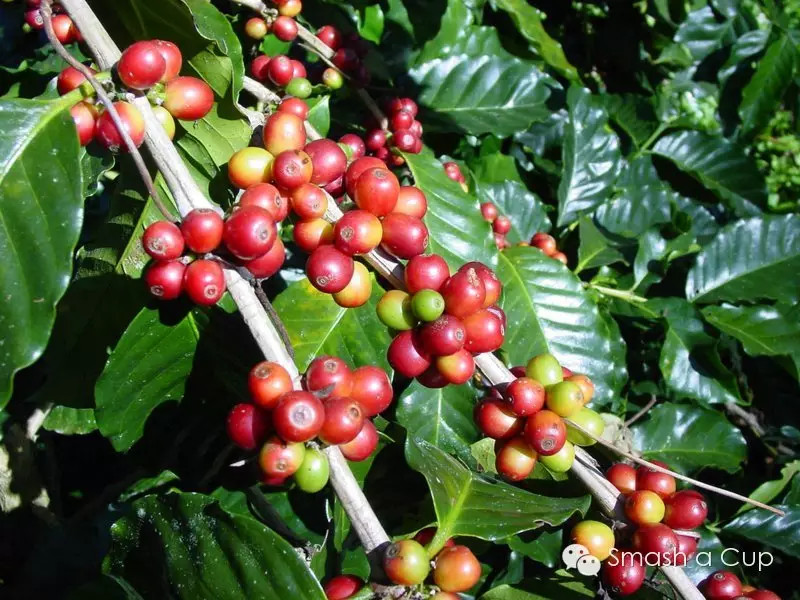Taste of Panamanian Coffee Flavor Manor area introduces Panamanian boutique coffee beans
In 1996, Blaise and Rachel visited a farm for sale in the Haramijun area of the Bocketi Valley, and was attracted by the beautiful farm and immediately bought it. This is Esmeralda. Daniel Lou, the third son of Haramiqiong Farm. It is in this farm that Mr. Bidasson has grown Geisha coffee that attracts the attention of the coffee world.
The pronunciation of Geisha is the same as Japanese geisha, so it is also called geisha coffee. Because the tree species are taller than ordinary coffee trees, they are originally planted in a small area of the manor and are used as windbreaks. In order to take part in the annual competition for the best coffee in Panama, the son of the manor owner searched all the coffee trees in the manor for testing, which gave Geisha a chance to appear on the stage. After that, he also participated in various world coffee competitions and won a total of 11 championships in the history of Esmeralda Farm: in 1924, the Swede Hans Elliot founded Esmeralda Farm, which was not a coffee grower but a ranch. Forty years later, in 1964, Mr. Danielupidason's grandfather, Ruth Ruth. Mr. Bidasson bought Esmeralda Farm in order to have an old home after retirement. His grandfather, Mr. Ruth Lover Bidasson, was born in Sweden and was president of the Bank of America and director of United Nations development. His son, Mr. Brais Bidarsson, moved to Panama from California in 1973 and inherited to run his father's farm. In 1987, most of the farms were changed to grow coffee. In 1994, he invested in the machinery and equipment of refined coffee in order to create a brand. Mr. Brais Bidarson and his wife Susan also raised three children, Elligu (born in Philadelphia in 1966). The species of Rachel (born in Sweden in 1967) and Danielu (born in Panama in 1974) was discovered in the rose summer forest of Ethiopia in 1931 and sent to the Coffee Institute in Kenya. It was introduced to Uganda and Tanzania in 1936, to Costa Rica in 1953, and to Panama in the 1970s by Mr. Francis Coselazin of Dongba Seven Farm Garden, who received seeds from CATIE in Costa Rica and began to grow Rose Summer Coffee.
Geisha, sweeping the coffee industry with the power of a hurricane, the coffee revolution is so fierce that the blue mountains of Jamaica and Kona of Hawaii, who have occupied the coffee kingdom for a long time, have to stay away. This wild species, which originated in Ethiopia, is now widely used in major coffee producing areas after numerous battles, and its best spokesman. The "LaEsmeralda" estate from Panama grows coffee from 1670 to 1850 meters above sea level, making it one of the two highest coffee farms in Panama (the other estate with such elevations should be Carmen in the Vulcan Valley).
At such a high altitude, the low temperature delayed the ripening of the coffee berries, about a month later than the normal ripening period, while the fertile volcanic soil provided sufficient nutrients for the coffee, coupled with the excellent microclimate brought by the Baru volcano, Elida Manor was able to achieve good results in cup test competitions.
In addition to creating good coffee cultivation conditions, the Lamastus family, which runs the Elida estate, has also planted many different native tree species on the estate, not only to shade the coffee trees, but also to provide a friendly habitat for birds. In terms of fertilization, the Lamastus family uses artificial fertilization and a small amount of chemical fertilizers, but never uses pesticides and herbicides that are harmful to the environment.
At present, in addition to Catuai, Typica and Bourbon, the Lamastus family also began to plant Geisha varieties a few years ago. In spite of this, Elida Manor used Catuai in all the batches of Best of Panama competition, but achieved good results again and again, which shows the excellent quality and special flavor of coffee brought by its geographical environment and excellent postharvest treatment technology.

Important Notice :
前街咖啡 FrontStreet Coffee has moved to new addredd:
FrontStreet Coffee Address: 315,Donghua East Road,GuangZhou
Tel:020 38364473
- Prev

Semi-washing treatment of Carmen Manor in Panama WBC entry bean list
Carmen Manor has 60% of the natural primeval forest, where coffee trees are planted and grow in the shade of these natural trees! As a result, the farm has been certified by Rainforest Alliance Association as ECO- OK environmentally friendly coffee! The coffee beans are harvested from late December to March of the next year, and the mature coffee cherries are harvested artificially, and the waste produced in the fruit treatment (if the meat or juice are properly piled up.
- Next

The finest coffee in Jamaica Blue Mountain Coffee Fine Coffee introduction Blue Mountain Coffee Flavor Manor
Some people add a lot of sugar and cream to their coffee in the hope that it will be more in line with them. But they all forget that Blue Mountain, which has added so many things, is not the original one. Just like the love that has been changed for him again and again, it can never go back to the past. I have forgotten how he moved himself at that time, but now we have all changed, just like adding countless milk and
Related
- Detailed explanation of Jadeite planting Land in Panamanian Jadeite Manor introduction to the grading system of Jadeite competitive bidding, Red bid, Green bid and Rose Summer
- Story of Coffee planting in Brenka region of Costa Rica Stonehenge Manor anaerobic heavy honey treatment of flavor mouth
- What's on the barrel of Blue Mountain Coffee beans?
- Can American coffee also pull flowers? How to use hot American style to pull out a good-looking pattern?
- Can you make a cold extract with coffee beans? What is the right proportion for cold-extracted coffee formula?
- Indonesian PWN Gold Mandrine Coffee Origin Features Flavor How to Chong? Mandolin coffee is American.
- A brief introduction to the flavor characteristics of Brazilian yellow bourbon coffee beans
- What is the effect of different water quality on the flavor of cold-extracted coffee? What kind of water is best for brewing coffee?
- Why do you think of Rose Summer whenever you mention Panamanian coffee?
- Introduction to the characteristics of authentic blue mountain coffee bean producing areas? What is the CIB Coffee Authority in Jamaica?

